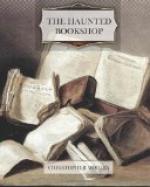“The mystery’s not over yet,” he said. “It’s been rebound. This isn’t the original binding.”
“Are you sure?” said Helen in surprise. “It looks the same.”
“The binding has been cleverly imitated, but it can’t fool me. In the first place, there was a rubbed corner at the top; and there was an ink stain on one of the end papers.”
“There’s still a stain there,” said Aubrey, looking over his shoulder.
“Yes, but not the same stain. I’ve had that book long enough to know it by heart. Now what the deuce would that lunatic want to have it rebound for?”
“Goodness gracious,” said Helen, “put it away and forget about it. We’ll all be dreaming about Carlyle if you’re not careful.”
Chapter V Aubrey Walks Part Way Home—and Rides The Rest of the Way
It was a cold, clear night as Mr. Aubrey Gilbert left the Haunted Bookshop that evening, and set out to walk homeward. Without making a very conscious choice, he felt instinctively that it would be agreeable to walk back to Manhattan rather than permit the roaring disillusion of the subway to break in upon his meditations.
It is to be feared that Aubrey would have badly flunked any quizzing on the chapters of Somebody’s Luggage which the bookseller had read aloud. His mind was swimming rapidly in the agreeable, unfettered fashion of a stream rippling downhill. As O. Henry puts it in one of his most delightful stories: “He was outwardly decent and managed to preserve his aquarium, but inside he was impromptu and full of unexpectedness.” To say that he was thinking of Miss Chapman would imply too much power of ratiocination and abstract scrutiny on his part. He was not thinking: he was being thought. Down the accustomed channels of his intellect he felt his mind ebbing with the irresistible movement of tides drawn by the blandishing moon. And across these shimmering estuaries of impulse his will, a lost and naked athlete, was painfully attempting to swim, but making much leeway and already almost resigned to being carried out to sea.
He stopped a moment at Weintraub’s drug store, on the corner of Gissing Street and Wordsworth Avenue, to buy some cigarettes, unfailing solace of an agitated bosom.
It was the usual old-fashioned pharmacy of those parts of Brooklyn: tall red, green, and blue vases of liquid in the windows threw blotches of coloured light onto the pavement; on the panes was affixed white china lettering: H. We Traub, DEUT Che APOTHEKER. Inside, the customary shelves of labelled jars, glass cases holding cigars, nostrums and toilet knick-knacks, and in one corner an ancient revolving bookcase deposited long ago by the Tabard Inn Library. The shop was empty, but as he opened the door a bell buzzed sharply. In a back chamber he could hear voices. As he waited idly for the druggist to appear, Aubrey cast




